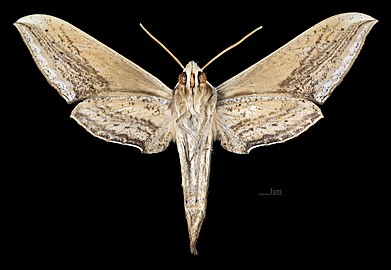Xylophanes falco
| Xylophanes falco | |
|---|---|

| |
| Male dorsal | |

| |
| Male ventral | |
| Scientific classification | |
| Domain: | Eukaryota |
| Kingdom: | Animalia |
| Phylum: | Arthropoda |
| Class: | Insecta |
| Order: | Lepidoptera |
| Family: | Sphingidae |
| Genus: | Xylophanes |
| Species: | X. falco
|
| Binomial name | |
| Xylophanes falco | |
| Synonyms | |
| |
Xylophanes falco is a moth of the family Sphingidae.
Disytibution
It is found from Honduras and Guatemala north through Mexico to southern Arizona and western Texas. It is generally found in oak woodland and along streamsides.[2]
Description
The wingspan is 70–80 millimetres (2.8–3.1 in). Adults are similar to Xylophanes monzoni but generally paler, with a less diffuse pattern and more falcate forewings. The abdomen has long, pale hair-like scales. The forewing upperside is pale brown-beige from the base to the apex with scattered black scales restricted to the leading edge anterior to the discal spot. The base of the wing has a pale purple suffusion and traces of two median lines running from the inner margin. There is a full complement of five dark brown postmedian and two submarginal lines, all sharply defined and converging to the apex. It is less contrastingly patterned than Xylophanes monzoni. The hindwing upperside ground colour is pale brown and the median band consists of two thin, straight, dark brown lines. The submarginal band is present and of similar colour and width to the two median lines, but it is distinctly darker than the grey marginal band.
-
Female dorsal
-
Female ventral
-
Caterpillar
Ecology
The larvae possibly feed on Bouvardia glaberrima. There is a single large eye on the thorax and six white circles down the side of the caterpillar. There are also extensive bands of white dots girdling the abdomen. Adults are on wing from June to September in Arizona and continuously in the tropics.
References
- ^ "CATE Creating a Taxonomic eScience - Sphingidae". Cate-sphingidae.org. Retrieved October 25, 2011.[permanent dead link]
- ^ "Silkmoths". Silkmoths.bizland.com. Archived from the original on November 12, 2011. Retrieved October 25, 2011.



